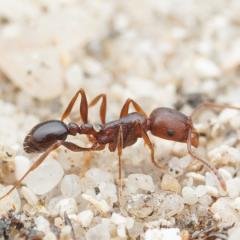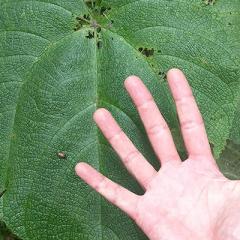Our research aims to understand the molecular mechanisms behind pain.
Pain is a major medical and socio-economic issue affecting one in five Australians.
Our research aims to understand the molecular mechanisms behind pain. The current focus of the lab is to use toxins from plants and venomous animals to understand the molecular pharmacology of pain. These toxins are highly selective for ion channels and receptors found in the sensory neurons that detect pain and can potentially be developed into novel analgesics.
Video: Native stinging tree toxins match the pain of spiders and scorpions
Group leader

Professor Irina Vetter
Group Leader, Understanding pain pathways
+61 7 334 62660
i.vetter@imb.uq.edu.au
UQ Experts Profile
The research vision of the Vetter group is to bring innovation to the area of neuropharmacology of pain by combining expertise in venom peptide discovery and characterisation with our outstanding capacity in in vivo and in vitro pain pathway characterisation. This approach will provide insight into the pathophysiology of pain, a better understanding of the role of ion channels in pain, and identification of novel putative pain targets that will generate long term transformational and translation/commercialisation impact to benefit patients suffering from pain.
Using this approach, we have discovered a novel compound from spider venom that acts on pain-sensing nerves specifically. It has potential as an analgesic without side effects such as tolerance or addiction. The ultimate aim of their research is to develop targeted treatments without side effects to help the one in five Australian’s living with chronic pain.
The Vetter group uses whole-cell patch-clamp electrophysiology, automated electrophysiology, high-content and high-throughput imaging of dissociated sensory neurons as well as transiently or stably transfected mammalian cell lines to assess pharmacological effects on a range of ligand- and voltage-gated ion channels as well as G protein-coupled receptors. Her group routinely perform high-content screening and pharmacological characterisation of compounds from a range of sources and have established a state-of-the-art behavioural facility and single-fiber extracellular recording setup at the University of Queensland for translational to preclinical models.
To investigate the neuropharmacology of pain we use a range of techniques including: in vivo pain pathway characterisation, high-content imaging of cultured sensory neurons, high-throughput screening using calcium and membrane potential assays, and traditional pharmacological assays. While all pain has similar symptoms, it is becoming clear that the underlying mechanisms behind pain can vary.
By uncovering these new pain pathways, as well as identifying novel targets on peripheral sensory neurons, we aim to develop more effective pain therapies that treat the underlying cause of the pain, not just the symptoms.
We always have a range of research projects available for volunteers, undergraduate and postgraduate students. If you are interested, please contact Professor Vetter.
- Discovery and development of novel analgesic venom peptides
- Pharmacological characterisation of sensory neurons
- Discovery and characterisation of ion channels and regulatory proteins
- Discovery and characterisation of pain mechanisms in a range of diseases
- Fundamental basis of peripheral sensory perception
- Identifying and characterising the effect of venoms and toxins on peripheral sensory neurons
- Identifying, characterising and optimising molecules with therapeutic potential from natural sources
- Understanding the pathophysiology of pain and optimising analgesic treatment approaches.
Neurotoxic peptides from the venom of the giant Australian stinging tree.
Gilding EK, Jami S, Deuis JR, Israel MR, Harvey PJ, Poth AG, Rehm FBH, Stow JL, Robinson SD, Yap K, Brown DL, Hamilton BR, Andersson D, Craik DJ, Vetter I, Durek T.Sci Adv. 2020 Sep 16;6(38):eabb8828.
Professor Vetter works in collaboration with other leading Australian and international researchers and welcomes new collaborations. Together with leading peptide chemists, molecular biologists, electrophysiologists, clinicians, NMR and structural biology experts, the Vetter group seeks to unravel the molecular and structural basis of nociception.
Our past and present collaborators span a network of world-class researchers with complementary skill sets that further strengthen our capacity to conduct the highest quality research and produce outstanding research outcomes. Our collaborators are the best in the world in their respective fields, including mathematics, biophysics, membrane interactions, structure determination, modelling, transcriptomics, ion channel pharmacology, chemistry, pain management and ex vivo sensory recordings.
Research Areas
Our research also investigates the mechanisms contributing to chemotherapy-induced pain, cancer-associated pain, inflammatory and neuropathic pain, and the painful marine toxin disease known as ciguatera.
Research Projects
Latest news
-
-
Stinging tree injects promise of pain relief
4 May 2023 -
IMB Inflazome Translational Award winner announced
21 November 2022
General enquiries
+61 7 3346 2222
imb@imb.uq.edu.au
Media enquiries
IMB fully supports UQ's Reconciliation Action Plan and is implementing actions within our institute.
Support us
Donate to research
100% of donations go to the cause













